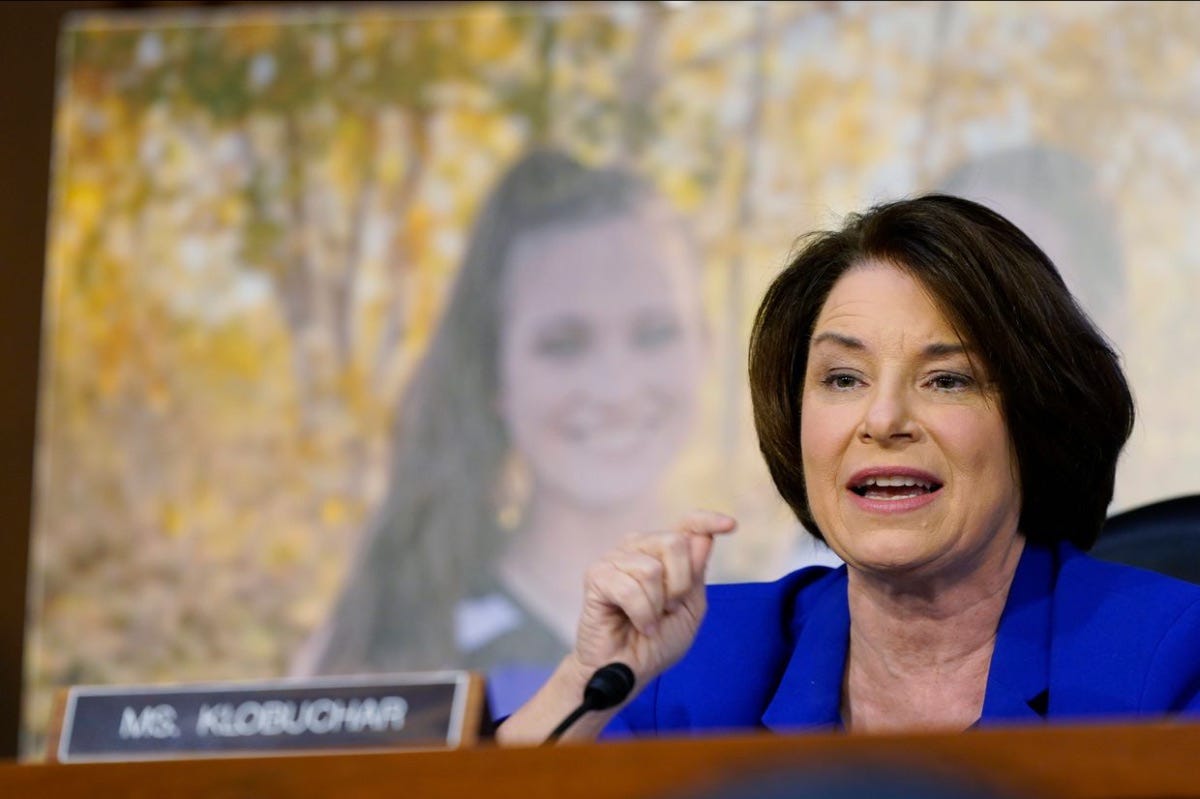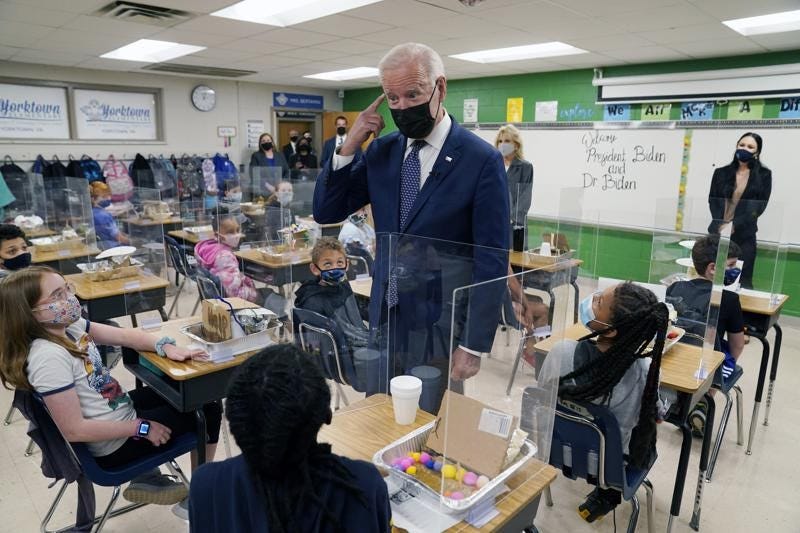Wake Up To Politics - May 11, 2021
Wake Up To Politics: Senate prepares for a voting rights showdown
Good morning! It’s Tuesday, May 11, 2021. Election Day 2022 is 546 days away. Election Day 2024 is 1,274 days away.
Senate prepares for voting rights showdown
With the House, Senate, and presidency under their control, Democrats have a lot of items on their legislative wish-list, from infrastructure to climate change to health care. But one bill has been stressed above all others, receiving the coveted moniker of “H.R. 1” and “S. 1,” which is reserved for a majority’s top priority.
That bill is the For the People Act, a sweeping package of democracy reforms that would overhaul the election system in the United States. But even though Democratic lawmakers have identified it as their No. 1 action item, “many say they have no idea how to pass it and wonder what exactly the end game is for a signature Democratic priority,” Politico recently reported.
S. 1, the Senate version of the measure, will face a crucial test today as the chamber’s Rules Committee holds a day-long meeting to “mark up” the bill, preparing it for consideration on the floor. As a quick refresher, here are some of the topline provisions in the legislation:
Requiring states to offer early voting, mail-in voting, same-day voter registration, automatic voter registration, and online voter registration
Allowing voters to sign affidavits instead of showing ID, reversing some state voter ID laws
Mandating that nonpartisan commissions oversee redistricting in each state, an attempt to end partisan gerrymandering
Introducing voluntary public financing for campaigns
Forcing super PACs and other “dark money” groups to disclose their donors, a partial reversal of the Citizens United decision
The version that the Rules Committee will consider today is a new 886-page “manager’s amendment” authored by the panel’s chair, Sen. Amy Klobuchar (D-MN). The revised bill seeks to address concerns raised by election administrators, extending key deadlines in the measure to give states more flexibility to implement the far-reaching changes.
Other senators will be given a chance to offer amendments as well: Sen. Jon Ossoff (D-GA) plans to propose a provision that would “ban states from restricting volunteers from giving food or water to Americans waiting in line to vote,” according to NBC News, in response to such an effort in his home state.
Both Senate Majority Leader Chuck Schumer (D-NY) and Minority Leader Mitch McConnell (R-KY) are expected to be on hand for today’s meeting. According to the Associated Press, McConnell will come prepared with “a stack of amendments”; his office says that he will be an “active” participant in the proceedings, arguing against the measure.
It is rare for party leaders to play much of a role in committee meetings, but their participation underlines how important S. 1 is to both sides: Democrats describe it as a key tool to expand voting rights and counter a recent slate of GOP voting bills, while Republicans have blasted it as a partisan takeover of elections. (There are also political considerations as well, with the Democrats viewing the changes as central to their electoral viability and Republicans viewing them as a potential obstacle.)
But even with both parties pouring focus on the legislation, it may not get much farther than the showdown today in the normally sleepy Rules Committee. Barring any changes to the Senate filibuster, the measure needs 60 votes to advance on the floor; right now, it is opposed by all 50 Republicans and doesn’t even have the support of all 50 Democrats.
Sen. Joe Manchin (D-WV) signaled in a March statement that he would only support bipartisan voting bill, writing: “We can and we must reform our federal elections together – not as Democrats and Republicans, but as Americans to restore the faith and trust in our democracy.”
Anyone who thinks there’s much of a chance of that happening should tune in to the partisan food fight taking place today and reassess accordingly.
The Rundown
What else you need to know today.
→ “FDA grants Pfizer emergency use for COVID-19 vaccine for children aged 12 to 15” CBS News
→ “Colonial Pipeline ‘ransomware’ attack shows cyber vulnerabilities of U.S. energy grid” Washington Post
→ “Gaza militants, Israel trade new rocket fire and airstrikes” Associated Press
Policy Roundup: Education
The week’s top education news, by Kirsten Shaw Mettler.
Some students have yet to return to in-person learning. Although the majority of K-12 schools are open, approximately 4 in 10 students are learning completely remotely, according to an Education Department survey. Disproportionately, those opting for remote learning are Black, Hispanic, and Asian American students, with many students choosing to stay remote in order to work jobs and assist in child care. Many school districts are announcing plans to ban or limit virtual learning for the 2021-22 school year.
Despite states easing COVID-19 public health guidance, colleges are tightening their restrictions. As institutions contemplate the feasibility of in-person commencements and mandatory vaccinations, many colleges have cracked down on their COVID-19 enforcement. Overall, cases at institutes of higher education seem to be on the decline, likely due in part to students getting vaccinated.
The U.S. Department of Education will hear public comments on Title IX in early June. New regulations on Title IX, which governs how universities and colleges respond to sexual assault, were issued during the Trump administration and met with criticism from survivor activists. President Biden has pledged to undo the Trump administration’s changes. This comment period is the first step in doing so.
More education policy headlines, via Kirsten:
President Biden has chosen Richard Cordray to lead the Office of Federal Student Aid. Cordray’s appointment is seen as a victory for progressives hoping for more aggressive action on student loan debt.
It is a unique year for college graduations. Some institutions are offering in-person commencements, while others are only holding virtual ceremonies. At some colleges, Class of 2020 graduates have been invited to walk with the 2021 students.
A number of Historically Black Colleges and Universities are reporting record enrollment this admissions season.
A message from Gabe
I’m committed to keeping Wake Up To Politics completely free and growing only by word of mouth. But to do that, I need your help — and now you can help share WUTP and win rewards at the same time!
Below, find your unique referral link: if three of your friends sign up using the link, you’ll get access to an exclusive Zoom Q&A session with me and other members of the WUTP news team! If 10 friends sign up, you’ll also get a free WUTP mug.
Thank you so much for your help sharing the newsletter. Copy your unique referral link to send to friends: *|RH_REFLINK|*
Or click to share your link directly to Twitter, Facebook, or email.
Ask Gabe
Your questions, answered.
Q: Will leaving Afghanistan save substantial dollars? Wondering how much saved that could be used on infrastructure efforts? — Lois E. of San Antonio, TX
A: The war in Afghanistan — which President Biden has pledged to end by September 11 — has certainly been a costly enterprise. According to an analysis by Brown University, the war has cost the United States more than $2.26 trillion in the past 20 years. Currently, that shakes out to about $15 billion to $20 billion annually, per an estimate by Todd Harrison of the Center for Strategic and International Studies.
Does that mean all that cash will suddenly be freed up to go towards an infrastructure package or other Biden administration priorities? Not exactly: much of that total goes to supporting Afghan forces, economic aid in the region, and other operational costs that the U.S. will continue to spend.
In fact, Mackenzie Eaglen (a fellow at the right-leaning American Enterprise Institute) argued in Foreign Policy magazine that “leaving costs more than staying,” noting the significant logistical costs of the pullout and the new counterterrorism capabilities that will have to be built up as a result of the withdrawal.
Not everyone shares that view: Harrison speculated that the U.S. could save $5 billion to $10 billion annually from the withdrawal. Either way, the savings will be relatively small, and will likely remain earmarked for Pentagon operations in the region, even if fewer troops are deployed there. As one columnist wrote in DefenseOne, comparing the situation to an expensive party: “Your DJ and band cost the same no matter the crowd size, and the planes ferrying your food and drink are coming on expensive flights whether you order one case of champagne or ten.”

Daybook
What’s happening in Washington today. (All times Eastern.)
President Joe Biden will receive his daily intelligence briefing at 9:30 a.m. Later, at 1 p.m., he will hold a virtual meeting with six governors: Charlie Baker (R-MA), Spencer Cox (R-UT), Mike DeWine (R-OH), Michelle Lujan Grisham (D-NM), and Janet Mills (D-ME), and Tim Walz (D-MN). According to USA Today, the bipartisan group will discuss “innovative ways to get more people vaccinated.”
Vice President Kamala Harris will meet with members of the Congressional Asian Pacific American Caucus at 4 p.m.
White House Press Secretary Jen Psaki will hold her daily press briefing at 12 p.m. The Senate will convene at 10 a.m. and resume consideration of two Biden sub-Cabinet nominees. At 11:30 a.m., the chamber will hold a vote to confirm Andrea Palm as Deputy Secretary of Health and Human Services, followed by a cloture vote to advance the nomination of Cindy Marten to be Deputy Secretary of Education. The Senate will then recess until 2:15 p.m. for the weekly party caucus meetings. At 2:30 p.m., the chamber will hold a confirmation vote on Marten.
The chamber may also hold votes later in the day on S.J.Res.15, which would invoke the Congressional Review Act to repeal the Trump-era “true lender” rule, and on the nomination of Chiquita Brooks-Lassure to be Administrator of the Centers for Medicare & Medicaid Services.The Senate Health, Education, Labor, and Pensions Committee will hold a hearing at 10 a.m. on the federal COVID-19 response. Witnesses will include Dr. Anthony Fauci and CDC Director Rochelle Walensky.
The Senate Rules Committee will meet at 10 a.m. to mark up S.1, the For the People Act.The House will convene at 2 p.m. The chamber is scheduled to vote on 14 pieces of legislation, most of them related to mental health.
House Speaker Nancy Pelosi will hold a ceremonial swearing in for Rep.-elect Troy Carter (D-LA) at 2 p.m. Carter won a special election to fill the vacancy left by former Rep. Cedric Richmond (D-LA), who is now a senior adviser in the Biden White House. With the addition of Carter, the narrow Democratic advantage in the House will grow to 219-212.
The Supreme Court is not in session.
Thanks for waking up to politics! If you enjoy reading this newsletter, I’d be so grateful if you’d consider donating to help support me and my work. If you want to show off your support for Wake Up To Politics, you can also buy some merchandise.
Also: don’t forget to tell your friends and family to sign up for the newsletter at wakeuptopolitics.com. And if you have any questions or comments, feel free to email me at any time.






